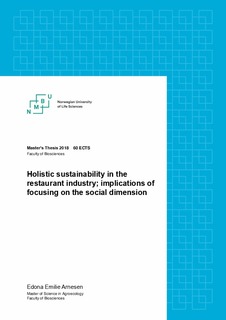| dc.description.abstract | The purpose of the study is to understand the food service industry better when it comes to sustainability, contributing to the body of literature engaged with the development of sustainable practices in the restaurant industry with focus on better guidance for the actors involved. This is done by exploring the open question ‘How can holistic sustainability in the restaurant industry be achieved by focusing on social sustainability and good work culture, and what are the implications of working towards sustainability with this focus?’. The study touches on all three dimensions of sustainability but has a special focus on the relationship between the social and the environmental dimensions. To understand the restaurant industry and its challenges with sustainability one must understand the organizational culture within the industry. Not only is there a need to make different choices to reach a more sustainable state, there is also a need to do things radically different, to change the patterns in which we act and the nature of those actions. These are areas of exploration in my study.
A qualitative research approach was taken using the methodology participatory action research (PAR). It is a methodology focusing on social change and the collaboration between the participants and the researcher. The methods I used in this study were foremost interviews and participatory observation, in addition to one focus group workshop. 12 interviews were conducted with interviewees of leadership positions in the food service industry. Supporting these main modes of data collection, I had informal conversations with several employees in the food service industry. Through these conversations I was able to acquire nuanced information and better contextual understanding.
The major findings from the data analysis were the three overarching themes ‘focus on caring for people’, ‘the importance of leadership’, and ‘economy being both a challenge and a tool’. This study found that in order to make positive development, the habits and attitudes of people must change, and the work culture of the restaurant industry must support well-being, inclusion and social longevity – pioneered by leaders with strong and transparent values of sustainability and a great focus on communication with their employees. This study has shown, as implicated in previous studies, that focusing on human factors can contribute to economic sustainability. There is also a clear link between the environmental and economic dimensions of sustainability, where economics is used as a tool in the restaurant industry to support environmental changemakers.
How can a focus on good work culture and social sustainability also affect environmental sustainability – the dimension most often thought of when discussing sustainability and ‘better practice’? If a culture of trust, transparency, care and acknowledgement of every person’s strengths and abilities is in place, it is inevitably easier to implement changes and get the whole team and company on board with executing them well. Not to mention, employees will most probably care about changing their practices because they are included every step of the way by their leaders. They get the opportunity to understand the reason for why they are to do things differently and how it coheres with the values and vision of the company. When this foundation is made, companies can contribute greatly to positive environmental impact, without sacrificing their economic stability.
This study also showed that sustainability can be – and is – so much more than what most people think of it to be, especially in relation to food and restaurants. Sustainability is about attitudes, habits, relationships, values and cooperation. It is about respect, coming together, valuing the invaluable and accepting the true cost of things. | nb_NO |

